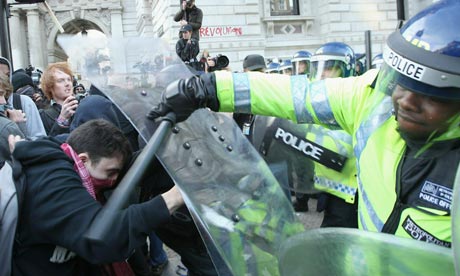Student protests: Met chief warns of new era of unrest
Sir Paul Stephenson says 'game has changed' as tuition fees campaign gathers momentum

Britain's most senior police officer warned today of a new era of civil unrest as the national campaign against university fee increases and education cuts gathered momentum.
His comments were seized on by critics, who said the hard-line rhetoric risked escalating tensions with students organising the nationwide grassroots campaign against education cuts.
Meanwhile, protesters today occupied 16 university campus buildings around the country. Six of the occupations – in Manchester, Newcastle, Leeds, Plymouth, Edinburgh and London – were expected to continue through the night. The Southwark and Bermondsey constituency office of Simon Hughes, the Liberal Democrat deputy leader, was also occupied by around 30 students from the London School of Economics.More demonstrations are planned for the next month. More than 11,000 students have signed up to another wave of classroom walkouts and marches planned for next Tuesday. The demonstration will coincide with a Commons debate staged by Labour in a bid to expose Lib Dem divisions over the coalition's plans to dramatically increase tuition fees.
Gareth Thomas, the Labour higher education spokesman, said: "Parliament is about to be asked to vote to make British universities some of the most expensive and worst funded worldwide without being allowed to consider in full, through a white paper, how the government's plans are supposed to work for students and their families. Too many questions remain unanswered."
"We have been going through a period where we have not seen that sort of violent disorder," Stephenson said. "We had dealt with student organisers before and I think we based it too much on history. If we follow an intelligence-based model that stops you doing that. Obviously you realise the game has changed. Regrettably, the game has changed and we must act."
In recent years the Met had reduced the numbers of officers deployed to tackle demonstrations, he said. "Regrettably, we are going to have to review that. We are going to have to take a more cautious approach."
Andrew Dismore, a former Labour MP who last year chaired an influential parliamentary inquiry into the policing of protests, said the commissioner's comments had been misguided. "I don't think the game has changed," he said. "The basic principles on how to police protest will be the same." Dismore questioned the tactic of containing schoolchildren within a "kettle", an area enclosed by police, and said Stephenson should resist using language that could inflame unrest.
"There is always a risk [that talk of disorder] becomes a self-fulfilling prophecy," he added. "He should be trying to de-escalate problems, not escalate them. The way to do that is to say he made a mistake at the demonstration outside the Tory party central office [on 10 November]. But that isn't then an excuse for overkill the next time protest comes along."
Dismore was backed by Aaron Porter, the National Union of Students' president, who said: "I would very much hope that the actions of a very small minority do not lead to an undermining of the public's right to protest peacefully."
Michael Chessum, a co-founder of the National Campaign Against Fees and Cuts, the group that called yesterday's day of action, also rejected Stephenson's comments. "It is the kind of policing we saw on Wednesday that creates disorder," he said. "If you refuse to allow people, many of them young, first-time protesters, the right to walk down the streets of their own capital city, and then 'kettle' them in Whitehall for eight or nine hours, people are going to get frustrated." He added that the vast majority of people on both demonstrations behaved peacefully.
Stephenson was also questioned by members of the MPA over the tactic of containing schoolchildren for several hours in freezing temperatures. "When you imprison thousands of people, which is essentially what you did yesterday, you do have a duty of care to them," said Jenny Jones, a representative from the Green party. "You kept people for nine-and-a-half hours. You punished innocent people for going on a protest. How can that be right? I just do not see it."
